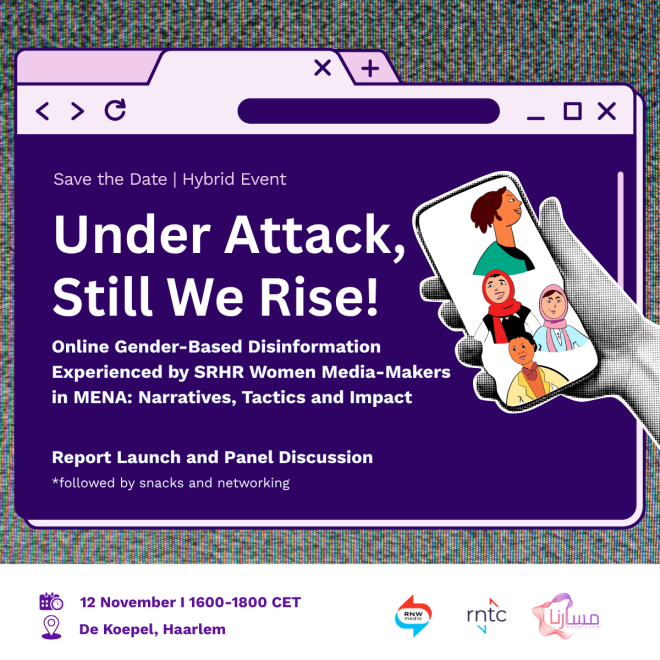Date: 12-11-2025Time: 4pm - 6 pmLocation: RNW Media, Koepel, HaarlemInvitation text from RNW Media:
Women and gender-diverse media-makers and politicians are at an increased risk of experiencing coordinated gender-based disinformation (GBD) attacks and campaigns in online spaces, particularly when they speak up and advocate for taboo and sensitive topics, such as sexual and reproductive health and rights (SRHR).
In our latest research, we examine how women SRHR media-makers in MENA experience online gender-based disinformation, its impact on their work, lives, and ability to participate online freely and without fear, as well as actors and narratives that underpin this form of disinformation in digital media spaces.
Join us for an interactive and insightful afternoon for the report launch and a panel discussion to reflect on the findings from the research and their implications to enable safe, inclusive and reliable digital media spaces for all.
Agenda
15:45 Doors open
16:00 Welcome by RNW Media
16:10-16:45 Report Launch and Sharing of Key Findings
16:45-17:30 Panel Discussion
17:30 – 18:00 Snacks and Networking
Panellists
- Afef Abrougui, Researcher
- Samia Allam, Desk Editor, Raseef 22
- Anne-Floor Dekker, Executive Director, WO+MEN Dutch Gender Platform
- Sana Naqvi, Senior Impact Manager,
- RNW Media Panel moderated by Surabhi Srivastava, Director of Media Innovation, RNW Media
Date and Time: Wednesday, 12 November 2025, 16:00 -18.00
Location: RNW Media, Koepel, Haarlem
About the Research
Across the MENA region, women and gender-diverse media makers advocating for Sexual and Reproductive Health and Rights (SRHR) face growing online threats. A 2021 UN study found that 60% of women and 70% of women activists feel unsafe online, with many targeted through harassment, smear campaigns, and gendered disinformation.
This RNW Media study explores how online gender-based disinformation (GBD) is used as a tool of technology-facilitated gender-based violence (TFGBV) in Egypt, Iraq, Jordan, Lebanon, and Palestine. Drawing from interviews with SRHR media makers and youth surveys, it uncovers the tactics, narratives, and impacts of these attacks. The study highlights the need for safer online environments, stronger accountability measures, and sustained support systems so that women and gender-diverse media makers can continue shaping inclusive, rights-based narratives without fear, (self) censorship or silence.
Participants
We thank Bwar Mohammed, Chrystine Mhanna, Diana W.S. Khanafer, Hadeel Alsabi, Inas Abdelhass, Elham Maswadeh, Raneem Hijazi and Samia Allam for their participation and insights that made this research possible.
